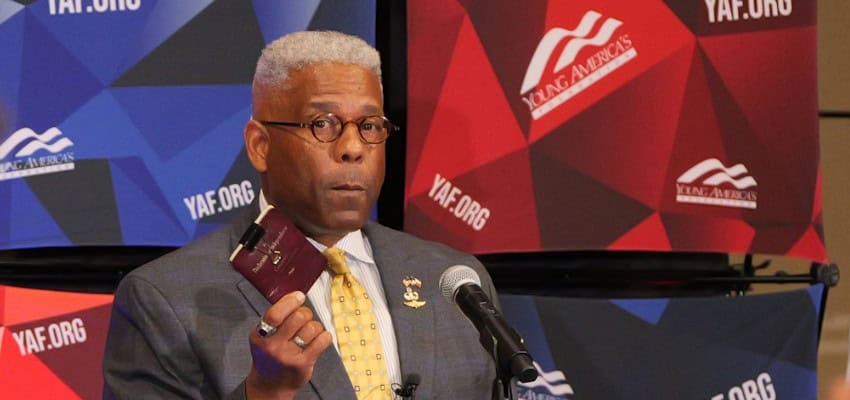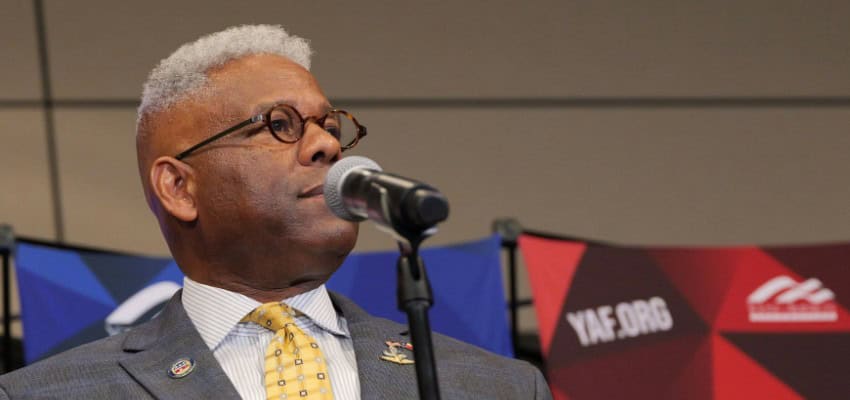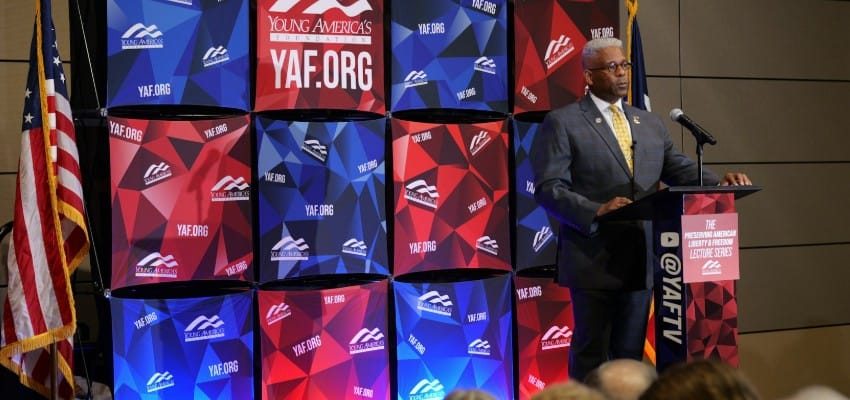COLLEGE STATION, Texas (April 17, 2025) — Former U.S. Congressman and retired Army Lieutenant Colonel Allen West stood before a packed room at Texas A&M University on April 16 and issued a challenge. His audience—mostly students, alongside faculty and local residents—came to hear him speak on “Preserving American Liberty and Freedom,” but left with more than historical anecdotes. They left with a call to action rooted in personal accountability and a sense of national inheritance.
West, invited by the Young Americans for Freedom chapter, did not hold back. He wove military memories, family stories, and sweeping views on American history into a 60-minute talk that frequently veered into commentary on the current state of higher education and political culture.
Early in the evening, West invoked the lesser-known historical marker of April 19, 1775—the day colonial militiamen met British troops at Lexington, Massachusetts. For West, it’s a date not merely to remember, but to reflect upon. He questioned how many people—students included—could recount its importance or draw a line from that moment to the modern debates surrounding civil liberties and the right to self-determination.
From Lexington, he pivoted to San Jacinto. The 1836 battle that secured Texas’ independence served as both a celebration of state pride and a parable of grit. West detailed the numerical disadvantage faced by Texan forces and their victory in just 18 minutes. That, he said, was the kind of conviction needed today—not on battlefields, but in civic discourse and educational spaces.
Throughout the speech, West warned of what he sees as an erosion of traditional values in American institutions, particularly universities. He criticized what he termed as “ideological colonization,” claiming that DEI (Diversity, Equity, Inclusion) frameworks prioritize conformity over thought, and warned that history is often reinterpreted through what he described as revisionist or politicized lenses. For West, the concern is not just academic—he sees it as a direct threat to the foundations of liberty.
The former congressman offered practical ways to resist what he perceives as cultural dilution. He encouraged students to post historical facts in public spaces, form informal study groups, and hold firm to personal convictions in the face of ridicule. Throughout his remarks, West also referenced his Christian faith, not as a theological argument, but as a personal lens through which he views liberty, moral agency, and civic duty.
West also addressed the structure and limitations of federal power, pointing to the Constitution as a safeguard against centralized overreach. He referenced Article I and Article II to underscore the defined responsibilities of Congress and the President, and cited the Tenth Amendment to argue that power not explicitly given to the federal government belongs to the states and the people. In his view, misinterpretations of executive authority and a lack of civic understanding contribute to cultural confusion and policy overreach—a problem, he suggested, that can only be solved by constitutional literacy.

The tone shifted further into advocacy during a dynamic Q&A session that followed. Students asked West how to stay grounded in a politically charged world, how to discuss history with younger generations, and how to begin public service careers with integrity. One student asked how to avoid losing direction once entering politics. West’s advice: know your core beliefs, stand by them, and resist pressures to compromise them for political favor or popularity.
Another attendee asked what young people should do when leaving college. West’s answer was a blend of mentorship and strategy. Know your five-year plan, he said. Set measurable goals. Don’t let others define your boundaries. In an age where identity politics often shape narratives, he urged students to reclaim ownership—not only of history, but of their own potential.
As the Q&A session unfolded, West also shared reading recommendations for those seeking a deeper understanding of governance and liberty. Chief among them was The Law by Frédéric Bastiat, a 19th-century political economist whose essay explores the proper role of government in protecting individual rights. He also referenced works by Alexis de Tocqueville and John Locke, encouraging attendees to study foundational political philosophy alongside American history.
His speech was layered with moments of humor and personal vulnerability. He recounted his own fear of heights before his first military parachute jump. That anecdote, though light-hearted, underscored his broader message: fear is natural, but purpose must be stronger.
As the evening drew to a close, West returned to his core message: freedom requires maintenance. Not just through elections or policies, but through stories passed from one generation to the next. To lose touch with those stories, he warned, is to risk losing the very idea of liberty.
The audience gave him a standing ovation, not only for his words, but for his insistence that each individual—student, parent, citizen—bear responsibility for the preservation of the nation’s ideals. And in that packed lecture hall at Texas A&M, the echo of history seemed not so distant after all.
Just as 77 colonists once stood on a green field in Massachusetts, West left the audience with this implication: today’s field may be figurative, but the stakes are just as real.
While West’s remarks centered on history, identity, and education, they also offer a lens into contemporary challenges faced by professionals in law, cybersecurity, and information governance. The erosion of civic and constitutional literacy—highlighted repeatedly in the lecture—has implications for how institutions interpret free speech, regulate digital behavior, and manage data rights. In environments increasingly shaped by ideological divisions, questions about authority, transparency, and compliance are not confined to the classroom. They shape the courtroom, the boardroom, and the code base.




























